
The VISION EQS in brief
Mercedes-Benz Vision EQS: A trailblazer for the entire Mercedes-Benz EQ family. The study provides an outlook on a new dimension in sustainable luxury.
Moving people: Mercedes-Benz stands for mobility and progress. The Vision EQS show car points the way to the future of Mercedes-Benz. Because two things are timeless: the need for transport and the desire for the very special.
Arousing enthusiasm: The VISION EQS creates a connection between rationality and emotion. It presents the thrilling design of future EQ models from Mercedes-Benz. Its “one bow” proportion and dramatic fluidity are stylistic heralds of a new generation of electric Mercedes-Benz vehicles.
Experiencing the future: For the first time, the generous spaciousness and new control concept of the Vision EQS show car provide a physical preview of the intuitive and digital interior and Advanced MBUX of future luxury saloons. A clear, flowing design idiom makes the individual parts of the entire dashboard blend into an integrated interior sculpture.
Technology taken further: In a sustainable future too, our customers will want a saloon that meets their wishes in terms of comfort, design and technology. The VISION EQS combines these in a concept for a fully-electric vehicle in the luxury class.

Mercedes-Benz Vision EQS show car
Lasting beauty that moves.
Stuttgart/Frankfurt. The Vision EQS, a milestone on the way to the future of Mercedes-Benz. At the International Motor Show in Frankfurt (12 September to 22 September 2019), Mercedes-Benz will show the challenges of the future: sustainability is becoming a central component of the brand philosophy, and a major aspect of our corporate strategy. The show car already meets these aspirations today, and provides an outlook on future large, electric luxury saloons. At the same time it illustrates a vision of purpose-built electro-design. With the Vision EQS, Mercedes-Benz is making a clear statement for the continued future of high-quality vehicles and self-determined driving. Supreme craftsmanship, emotive design, luxurious materials and individual driving pleasure will continue to be desirable in the future. Because now and for the future, luxury above all stands for personal freedom as well.
Seamless, digital and electric – the design
With its innovative, stretched “one bow” proportion, the VISION EQS takes the Progressive Luxury design philosophy of the EQ models by Mercedes-Benz into a new dimension. The flowing yet powerful sculptured effect of the exterior design gives the show car its majestic appearance – luxurious generosity and aerodynamic elegance in ideal harmony.
The prominent, continuous “lightbelt” structures the exterior in a new way. The resulting colour division at shoulder level creates the impression of a “black panel” glass landscape floating on the silver vehicle body – a seamlessly connected vehicle surface from the striking EQ front grille to the rear.
In an innovative way, the VISION EQS appears both sensuously elegant and dramatically charged with this design.
Technical gems – precision in detail
Technologically futuristic features include the DIGITAL LIGHT headlamps, each with two holographic lens modules, integrated into the continuous 360-degree exterior lightbelt. These not only lend the vehicle the serene gaze so typical of a Mercedes, but also allow an almost unlimited number of light variations that provide an outlook on future light configurations by Mercedes-Benz.
The brand logo also has new tasks: 229 illuminated, individual stars form the seamlessly integrated lightbelt at the rear, causing the brand’s trademark to shine out in a previously unknown way.
Interaction between the vehicle and its environment is not just limited to the lights in the VISION EQS. The digital front grille, which realises a light matrix consisting of 188 individual LEDs as a world first, provides a new level in precise signalling. Once the black panel comes to life, the seemingly free-floating stars and pixels create a fascinating, three-dimensional effect.
Atmospheric generosity in the interior
In the interior the VISION EQS takes its inspiration from the world of luxury yachts. The clear, flowing design idiom creates a new level of serenity – and with it the vision of modern luxury interpreted into the future.
For the first time the entire dashboard blends with the body of the front trim section to form an interior sculpture. With its deep and open spatial architecture, the cockpit of the VISION EQS envelops the occupants like the deck of a boat. The fully integrated, embracing overall sculpture consisting of the combined dashboard, centre console and armrests floats above the generous interior and for the first time gives an outlook on the interiors of future luxury saloons by the brand.
The choice of materials for the interior of the show car also ensures a special ambience. Mercedes-Benz has systematically developed the use of sustainable materials further, and uses both traditional and technologically advanced materials. High-quality DINAMICA microfibre in crystal white is used alongside native figured maple trim. This is made from recycled PET bottles. Also used is artificial leather, with a finely structured surface similar to nappa leather. The material used for the roof liner comes from a special project: a high-quality textile was created by adding a quantity of recycled “ocean waste” plastic, putting the use of sustainable materials on a wholly new level.
Intuitive Interaction – Advanced MBUX
The VISION EQS presents a large interior sculpture as a stage for the future: digital content can be experienced by immersion over the entire surface, creating an all-embracing atmosphere. The blending of materials and information illustrates a possible intuitive interaction in the future.
The organically emerging displays and projection surfaces provide display space, as does the intelligent CONNECTED LIGHT that surrounds the occupants. Haptic highlights such as the air vents integrated into the trim element like inlays, the sophisticated speaker covers in rosé gold and the fragrance flask encased in a decorative holder like a jewel round off the trendsetting interior of the VISION EQS and show exquisite craftsmanship.
Into a fully-electric future with Mercedes-Benz EQ Performance
With electric motors at the front and rear axles and the battery integrated into the vehicle floor, the VISION EQS represents a very well-balanced vehicle concept. The basis for dynamic high-level performance and safety comes courtesy of the electric all-wheel drive with axle-variable torque distribution and a battery installed deep in the vehicle floor between the axles. Thanks to more than 350 kW of output and immediately available torque of around 760 newton metres, the VISION EQS accelerates from 0-100 km/h in under 4.5 seconds.
And not only the performance is impressive, as the outstanding energy efficiency also sets standards. As a result, thanks to an intelligent operating strategy, the show car has a comfortable operating range of up to 700 km according to WLTP. Assuming a charging performance of 350 kW, the show car recharges the battery to 80% in considerably less than 20 minutes.
“With the Vision EQS technology platform, Mercedes-Benz is opting for a completely new, fully-variable battery-electric drive platform. This is in many respects scalable and usable on a cross-model basis: thanks to the modern modular system, the wheelbase and track, as well as all other system components, and especially the battery, are variable and therefore suitable for a wide range of different vehicle concepts. As well as from in-house development and production expertise, Mercedes-Benz benefits from a group and model series-wide modular strategy for alternative drive systems, and direct access to key components for e-mobility. For example, the highly-efficient lithium-ion battery comes from the Daimler subsidiary ACCUMOTIVE.
As is the case with modern series production models by Mercedes-Benz, the vehicle structure is based on an intelligent multi-material mix of steel, aluminium and carbon fibre, plus sustainable materials made from recyclates. This optimally meets the requirements with respect to lightweight design, strength, cost efficiency and sustainability.
The VISION EQS also makes a clear statement for the continuation of driver-controlled vehicles. To this end the show car shows the bandwidth of the platform with its clear focus on the driver. Mercedes-Benz will also be in a position to fulfil the desire for individual mobility and thrilling handling characteristics in the future. At the same time the Vision EQS show car supports the driver with highly-automated driving at Level 3, e.g. on longer motorway journeys. Thanks to the modular sensor systems, the level of autonomy can be extended up to fully-automated driving in the future.

Technical data:
| CO2 emissions | 0 g/km |
| Range (WLTP) | up to 700 km. |
| Output | approx. 350 kW |
| Acceleration (0-100 km/h) | < 4.5 seconds |
| Top speed | > 200 km/h |
| Peak torque | approx. 760 Nm |
| Battery capacity | approx. 100 kWh |
| Charging output (DC) | 350 kW |
| Drive system | All-wheel drive (fully variable) |
Mercedes me Charge for sustainability here and now
Mercedes-Benz is aspiring to a CO2-neutral new car fleet in 20 years. This means a fundamental transformation of the company in less than three product cycles. The way towards sustainable mobility is therefore innovation – with a comprehensive approach. The aim is to arouse customer enthusiasm for climate-neutral mobility and emission-free driving.
In some regions, and depending on how it is generated, electric power is a very significant source of CO2 over the life cycle of an electric car. Accordingly Mercedes-Benz seeks to encourage customers to charge their cars with “green” energy. Solutions such as Mercedes me Charge make it possible for car drivers to conveniently charge their vehicles at many different public charging stations in Europe, wherever possible with energy from renewable sources.
With IONITY, a joint venture between BMW Group, Daimler AG, Ford Motor Company and the Volkswagen group with Audi and Porsche, Mercedes-Benz also offers its customers convenient access to an efficient rapid-charging infrastructure along major European traffic arteries. More than 100 of the 400 charging parks planned in Europe by 2020 are already in operation.

Our driving force
The Vision EQS show car as a milestone in a new era for the automobile
Everything is in constant change. It has always been so, as mobility requires technical progress. “First move the world” is therefore the deeper purpose of our work at Mercedes-Benz, and our motivation. It means pursuing more than the directly attainable. This pioneering spirit is part of the brand’s DNA. Which also makes it a cornerstone of the new, sustainable business strategy.
The Vision EQS show car is an outlook on the future of Mercedes-Benz. Because two things are timeless: the need for mobility and the need for luxury. Plus an inner uncertainty about what will come next.
The VISION EQS is a first milestone on the way to a CO2-neutral mobility of the future. Mercedes-Benz has always stood for technical innovation, responsibility and fascination. And sustainability is now another integral component of the brand philosophy. The show car already meets these aspirations today, and gives an outlook on the future, large electric saloons by the brand.
With the show car, Mercedes-Benz is making a clear statement for the continued future of high-quality vehicles and self-determined driving. Supreme craftsmanship, emotive design, luxurious materials and individual driving pleasure will continue to be desirable in the future. Because nowadays, luxury is also partly defined as personal freedom.
Design
A statement. Sustainable. Intelligent. Luxurious. Mercedes-Benz.
With its innovative, stretched “one bow” design, the VISION EQS takes the Progressive Luxury design philosophy of the EQ models by Mercedes-Benz into a new dimension. The “seamless” look of this dramatic and powerful sculpture is what gives the VISION EQS its majestic presence.
Technical features such as the 24-inch multi-spoke wheels, which form a jewel-like counterpiece to the flowing body lines of the VISION EQS, emphasise the luxurious character of the Saloon. As do the rear lights, which are for the first time seamlessly integrated into the body. With 229 individual LED stars they show a completely new approach to applying the brand logo.
The significant contrast created by the continuous 360° exterior lightbelt joining the black-panel LED matrix grille and the headlamps with the rear light clusters defines a new form of exterior structure with its technical precision. The resulting colour division in the shoulder area not only creates a characteristically contrasting exterior. The impression of a glass dome floating on the vehicle body also visually stretches this ultra-modern saloon. At the same time the contrast underlines the aesthetic dynamism of the show car as a whole.
The light of the future: DIGITAL LIGHT holographic lens headlamps
However, the design goes another step further. Thanks to seamless integration of the lights, the VISION EQS becomes a communicative vehicle, a “cooperative car”. The 360-degree exterior lightbelt, the digital LED matrix grille and the DIGITAL LIGHT headlamps allow interaction between the vehicle and its surroundings.
The black-panel grille, which has been realised with several levels as a world first, provides a new level of precise signalling. Its light matrix consists of 188 circuit boards, each of which carries 5 individually actuated LEDs and a single star. With this total of 940 individual LEDs in a three-dimensional space, the light signals with which the vehicle communicates with its surroundings create a fascinating impression of depth. The lightbelt traversing the grille also indicates membership of the EQ product family.
Another highlight of the VISION EQS are the new DIGITAL LIGHT headlamps, each with four holographic lens modules. Once the black panel comes to life, the seemingly free-floating stars and pixels create a holographic effect of floating light modules.
In the process these so-called holographic lens modules rotate at well over 2000 rpm. This high rotational speed suggests a static image to the human eye, and with specific actuation it even allows individual holographic images to be generated. The main module and circuit boards become practically invisible thanks to the high rpm, causing the 500 LEDs per headlamp to “float” in space. As each one of the less than one millimetre large high-performance LEDs is actuated individually, and can rotate at three different levels, the “floating” 3D impression is additionally reinforced.
DIGITAL LIGHT technology creates an almost unlimited number of display possibilities, providing an outlook on the future use of lighting by Mercedes-Benz. It also shows that the light of the future will no longer just be a key safety feature, but also a key element in man-machine communication, aesthetics and design.

Flowing forms: the interior as a sculpture
An integrated interior emerging from the form and organically enveloping the occupants is the new interpretation of the Mercedes-Benz wrap-around effect.
The interior design takes its inspiration from the world of luxury yachts. The clear and generous design idiom creates a new level of serenity. For the first time the entire dashboard blends with the body of the front trim section to form an interior sculpture. With its deep and open spatial architecture, the cockpit of the VISION EQS envelops the occupants like the deck of a boat. The fully integrated, embracing overall sculpture consisting of the combined dashboard, centre console and armrests floats above the generous interior like a gentle, expansive landscape, and for the first time gives an outlook on the interiors of future luxury saloons by the brand.
To emphasise this new spatial impression even more, the IAA show car is presented in a highly artistic manner so that the contours and lines in the interior are even more obvious to the eye.
Haptic vision: an outlook on the materials of the future
The innovative choice of materials for the interior of the VISION EQS is also intended to create a special ambience. Mercedes-Benz has systematically opted for sustainability, using both traditional and technologically pioneering materials. Crystal-white DINAMICA microfibre on the seats contrasts with rosé-gold coloured highlights at the seam ends of the contrasting diamond pattern. The floor area and door centre panels are in bright white. A dynamic, embossed diamond pattern presents the sustainably produced microfibre particularly impressively. Artificial leather is used at the side sills to create a harmonious counterpoint. Its finely structured surface is very similar to that of nappa leather, and has contrasting topstitching around the borders like that on familiar Exclusive leather features.
The innovative textile in the roof liner is a special project: it contains a proportion of “ocean waste” plastic, and for the first time brings recycled plastics into use in visible, high-quality areas. Sustainability is also the watchword for the wood trim in the VISION EQS. Home-grown figured maple from ecologically managed German forests not only ensures short transport distances and a correspondingly small CO2 footprint, but also helps to conserve exotic tropical woods.
Advanced MBUX for intuitive Interaction.
The VISION EQS also makes new digital departures. The IAA show car therefore shows the expansive interior sculpture as a presentation piece for the future: digital content can be immersively experienced over the entire area, allowing information and content to be accessed by touch to create an all-embracing atmosphere. The blending of materials and information illustrates a possible intuitive interaction in the future.
The central display organically emerging from the centre console provides a specific outlook on new ergonomic concepts. Vehicle functions can now be operated by touch-control on the generous display surface. Maximum comfort on every seat: the side displays on the driver and front passenger seats allow individualisation of the driving experience by entering the Mercedes me ID – in future also for the front passenger. It is not only the displays that create a man-machine interface, but also the intelligent Connected Light, which runs around the entire interior like the 360° lightbelt on the exterior and is able to communicate by positioning information in space. On the one hand this ambient light band creates special lighting moods inside the vehicle, but it can also communicate information to the passengers.
Haptic highlights like the air vents integrated into the trim element like inlays, the sophisticated speaker covers in rosé gold and the fragrance flask encased in a decorative holder like a jewel round off the trendsetting interior of the VISION EQS and show exquisite craftsmanship and the unrivalled quality claim of the Mercedes-Benz brand.

Technology
With its battery-electric platform, Mercedes-Benz is clearly committing itself towards emission-free mobility.
A combined output of over 350 kW gives the VISION EQS the performance of a super-sports car. With a compact high-performance power unit at each axle, the show car sets a new standard in EQ performance. Thanks to intelligent and fully variable torque distribution, the immediately available power from the two motors is not only managed for best possible handling, but above all for outstanding efficiency. As a result, thanks to an intelligent operating strategy, the show car accelerates from 0-100 km/h in under 4.5 seconds and has a comfortable operating range of up to 700 km according to WLTP. Above all, the latest-generation electric motors with highly-integrated power electronics and transmission ratios are a quantum leap in efficiency. At a charging output of 350 kW, the VISION EQS recharges the battery to 80% in significantly less than 20 minutes. Accordingly the EQ concept not only impresses with its dynamism, but also sets new efficiency standards.
The VISION EQS also makes a clear statement for the continuation of driver-controlled vehicles. In the case of the show car this means a clear focus on the driver. This means that Mercedes-Benz will also be in a position to fulfil the desire for individual mobility and thrilling handling characteristics in the future. At the same time the VISION EQS show car supports the driver with highly-automated driving at Level 3, e.g. on longer motorway journeys. Thanks to the modular sensor systems, the level of autonomy can be extended up to fully-automated driving in the future.
With the Vision EQS technology platform, Mercedes-Benz is opting for a completely new, fully-variable electric drive platform. This is in many respects scalable and usable on a cross-model basis: thanks to the modern modular system, the wheelbase and track, as well as all other system components, and especially the battery, are variable and therefore suitable for a wide range of different vehicle concepts. As is the case with modern series production models by Mercedes-Benz, the vehicle structure is based on an intelligent multi-material mix of steel, aluminium and carbon fibre, plus sustainable materials made from recyclates. This optimally meets the requirements with respect to lightweight design, strength, cost efficiency and sustainability.
As well as from in-house development and production expertise, Mercedes-Benz benefits from a group and model series-wide modular strategy for alternative drive systems, and direct access to key components for e-mobility. For example, the highly-efficient lithium-ion battery comes from the Daimler subsidiary ACCUMOTIVE.
Next-generation EQ models with battery cells from CO2-neutral production
In implementing its long-term goal of climate neutrality, Mercedes-Benz Cars is taking action in its supply chain as well as systematically electrifying the product range: for the next vehicle generation of the product and technology brand EQ, some of the battery cells are already to be wholly produced using power from renewable sources. In purchasing battery cells from CO2-neutral production, Mercedes-Benz Cars is making a major contribution on the way to a CO2-neutral new car fleet in twenty years.
In this way Mercedes-Benz Cars is taking the next step towards “Ambition 2039” climate-neutral mobility, and intensively driving implementation forward with its suppliers and partners. The supplier network accounts for a significant proportion of value creation, and is therefore of great importance for the decarbonisation targets. To this end, in the interests of a comprehensive view along the entire value creation chain, Mercedes-Benz has entered into a sustainability partnership with a major battery cell supplier.
As a first result of the sustainability partnership, by purchasing CO2-neutrally produced battery cells, Mercedes-Benz Cars will reduce the overall CO2 footprint of all the batteries in future vehicle models by considerably more than 30%. The partnership includes power generated from renewable energy sources plus recycling and respect for human rights in the supply chain.
AMBITION2039
Our way to sustainable mobility
Mercedes-Benz is aspiring to a CO2-neutral new car fleet in 20 years. This means a fundamental transformation of the company in less than three product cycles. This is not a long period of time when one considers that fossil fuels have dominated the industry ever since Carl Benz and Gottlieb Daimler invented the automobile over 130 years ago. But as a company founded by engineers, Mercedes-Benz believes that technology can help to create a better future. At present nobody can say with certainty what drive mix will best meet the needs of customers in 20 years’ time. This is why Mercedes-Benz is encouraging politicians to prepare the way for technological neutrality: setting goals, but not the way in which they are achieved. At present the focus is on battery-electric mobility. At the same time it remains important to work on other solutions such as the fuel cell or synthetic fuels, so-called “E-fuels”.
Factory 56 as a role model for CO2-neutrality
The way to sustainable mobility is therefore innovation – as a comprehensive approach along the entire value creation chain. The new Factory 56 at Mercedes-Benz shows the direction: this new plant on the Sindelfingen site uses renewable energies and was designed to be CO2-neutral from the start. All the European plants will follow this principle by 2022. The new plant in Jawor, Poland is a good example of how sustainability and cost efficiency can be reconciled. Wind power ensures that production here is not only greener, but also more cost-effective than would be possible with conventional electric power. The EQC in the Bremen plant and the batteries in Kamenz, Saxony are also produced using power from renewable sources. A comprehensive view of CO2 savings must also take the recycling of raw materials into consideration. Mercedes vehicles have a potential recycling rate of 85 percent. Mercedes-Benz is therefore moving from a value creation chain to a value creation circuit.
Awakening enthusiasm for climate-neutral mobility and making emission-free driving possible.
In some regions, and depending on how it is generated, electric power is a very significant source of CO2 over the life cycle of an electric car. Mercedes-Benz wants to inspire its customers to charge their green vehicles with green power. For example, solutions such as Mercedes me Charge make it possible for car drivers to conveniently charge their vehicles at many different public charging stations in Europe, wherever possible with energy from renewable sources. However, the transformation to the sustainable mobility of the future will only be successful if the car industry, energy suppliers and politics work hand in hand. This requires massive investments and specific measures, also beyond the automobile sector itself. Climate-neutral energy and a comprehensive infrastructure are indispensable for this paradigm change. Mercedes-Benz is open to discussions about the effective pricing of CO2 and incentives for low-carbon or carbon-free technologies – if possible at global level. For us as a company, the Paris Climate Accord is more than a commitment – it is a conviction. And Mercedes-Benz has set itself a clear course to contribute to climate protection.
IONITY and Mercedes me Charge offer infrastructure and charging solutions for sustainability here and now
Mercedes-Benz is aspiring to a CO2-neutral new car fleet in 20 years. This means a fundamental transformation of the company in less than three product cycles. The way towards sustainable mobility is therefore innovation – with a comprehensive approach. The aim is to arouse customer enthusiasm for climate-neutral mobility and emission-free driving. In some regions, and depending on how it is generated, electric power is a very significant source of CO2 over the life cycle of an electric car. One thing is clear for Mercedes-Benz: the mobility transformation and the energy transformation must go hand in hand. Accordingly Mercedes-Benz seeks to encourage customers to charge their cars with “green” energy. Solutions such as Mercedes me Charge make it possible for car drivers to conveniently charge their vehicles at many different public charging stations in Europe, wherever possible with energy from renewable sources.
With IONITY, a joint venture between BMW Group, Daimler AG, Ford Motor Company and the Volkswagen group with Audi and Porsche, Mercedes-Benz also offers its customers convenient access to an efficient rapid-charging infrastructure along major European traffic arteries. More than 100 of the 400 charging parks planned in Europe by 2020 are already in operation, and customers are already able to charge their vehicles almost completely with green energy. Because this too is modern luxury: our customers are able to rely on Mercedes-Benz offering them a well-conceived overall concept for all aspects of their vehicle.
Our task today is individual mobility without emissions.
Once again, this requires technology and determination. To underline the seriousness, Mercedes-Benz links part of the Board of Management remuneration to achievement of the sustainability goals, including the CO2 footprint. Every employee must leave his or her comfort zone to achieve progress in new ways. This transformation is the task of the present generation. Mercedes-Benz has the right team to master it successfully. This strategy will help us to reassert our leading position in the car industry.

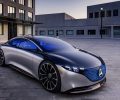
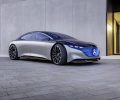
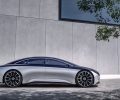
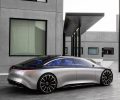
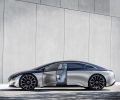
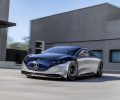
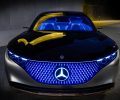
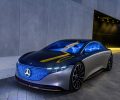
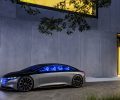
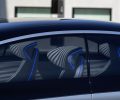
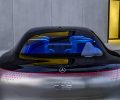
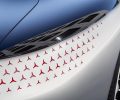
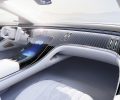
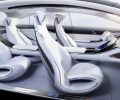
You must be logged in to post a comment.